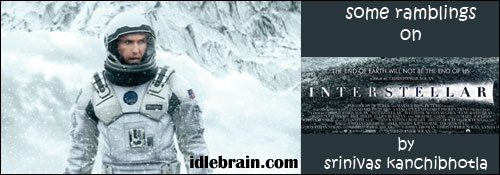
A gaze at the infinite above can elicit one of the two reactions - one, being one of great insignificance: among the billions of galaxies suspended in space, the countless stars within them each oblivious of other, and the innumerable solar systems that center around the stars, here is a tiny speck of blue called earth, where life was seeded, adapted to the conditions and prospered, learned to survive breathing oxygen and sipping water. Knowing all that astronomy has thrown up till date, the one feeling that life has/should have sizing itself up against the great expanse up above is one of humility. That the earth is not special, its place/order in the grand scheme of things doesn't even register a blip, that coincidence and randomness played more part than intelligence and design in both its being and well being, become more and more evident as science broadens the horizons of awareness and powerful telescopes shine new light on hitherto unknown frontiers. The sense of individual has no place here. He is no more or no less than the billions of organisms he cohabits the planet with, except this one has little more self-awareness and an eagerness to explore. The second reaction is a little more personal one. Out of the same plethora of possibilities in the universe with a wide variety of environmental conditions, the chances of life happening on just one from a billion other known places calls for an examination that is beyond physical and scientific. Even on the off-(but very plausible) chance that life on other planets in other galaxies (that humans have already looked into) persisted and perished much before it took root on earth, it behooves on humanity to make that journey in search for its ancestors. This is a very personal emotion, the need to search for the origins, one ingrained in the genetic makeup of the mankind. As the brilliant astro-physicist Carl Sagan once aptly put, if it is just us out there, it is indeed an awful waste of space. Both these reactions though appear contradictory to one another, are in fact two halves that make up the whole. And 'Interstellar's intense personal journey into the deep bowels of the universe is the other half of the cold, clinical and detached view about a similar journey in Stanley Kubrick's '2001: A Space Odyssey'.
While both these movies follow similar plot trajectories, the motives behind embarking on the star voyages could not be more different. While '2001' keeps the individual aspect away out of the proceedings and takes a more grander stance on the evolution of man, 'Interstellar' restricts the purview of its vision to a more personal perspective. At the heart of both these movie lies the actual journey, the journey to beyond. But what an amazing, awe-inspiring and jaw-dropping trip it is, flying past the Saturn rings, through the worm holes, on to planets desolate and daunting and finally deep diving into the blackhole! These images at that scale are something that have never been committed to celluloid (one of the very few movies where the word 'celluloid' could still be used in a literal sense, in the current age of air brushed squeaky clean digital film making) and the results (on a true 70mm IMAX format) are simply breathtaking. It is interesting how within a span of an year, two movies (Gravity and Interstellar), pushed the envelope in space voyage film making to far greater limits than had been possible in the half century or so since Kubrick's 'ultimate trip' of man. While the science and mechanics part of the star trip in 'Interstellar' are beyond reproach (with academicians and scientists with credible reputations and credentials on board as consultants), where it feels a bit vulnerable is in matters dealing with the heart. And here Nolan falls back on his trademark strength as a master analyst where he deciphers the construct of 'love' being the prime motivation behind humanity's needs for survival. The concern of humanity for its progeny and the regard it has for its roots compels it to get to any length ensuring its safety and betterment. That composite feeling that is love, which is an amalgamation of care, concern, anxiety, frustration and regard, explains man's inventions, discoveries, his quests, conquests and explorations. And it is this beautiful marriage of science and sentiment that sets 'Interstellar' apart from the '2001' on whose shoulders the former stood and glanced upon the worlds further up on the Big Bang scale.
The only jarring note in an otherwise solid presentation is the surprising cameo that comes in the latter part of the movie with the only purpose of propelling the plot towards its denouement. Amazingly, this entire sequence involving the cameo reeks of the influence of HAL in '2001'. If Nolan considered this to be an explicit tip of the hat to '2001', it feels a bit forced here where the same plot point appeared integral and organic in '2001'. But for this minor aberration, 'Interstellar' is thought-provoking, awe-inducing, thrilling entertainment (who could have thought an otherwise painfully slow, pin point precise, boring docking sequence can serve as a setup to an edge of the seat action piece) that not just tries to find man's place in wide open space, but also wears his heart on its sleeve while doing so, a solid bridge between imagination of the heart and understanding of the mind.
checkout http://kanchib.blogspot.com for Srinivas's Blog.
